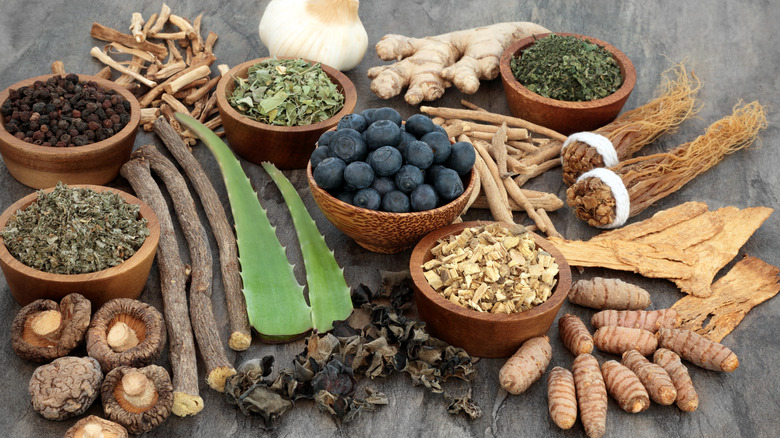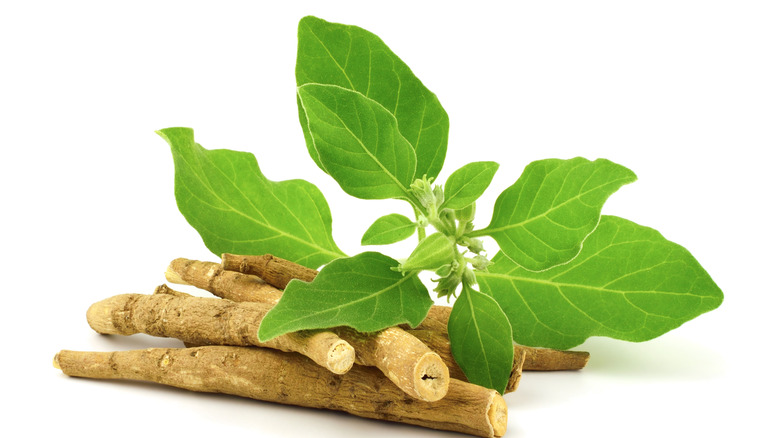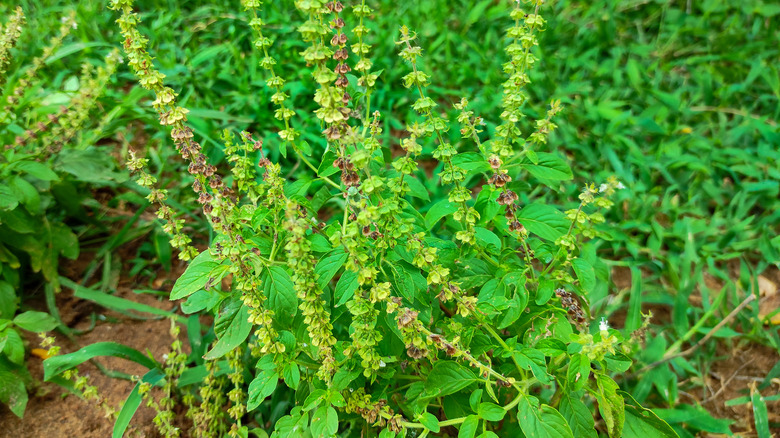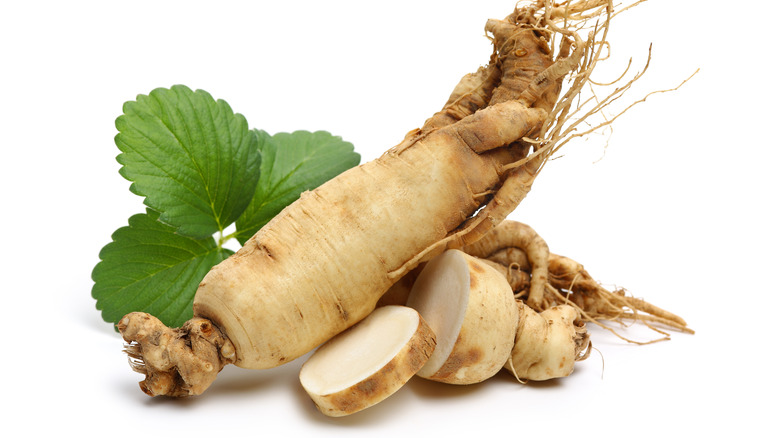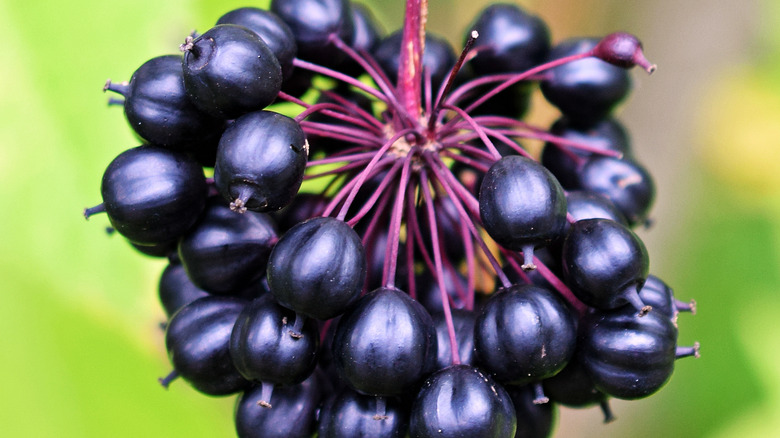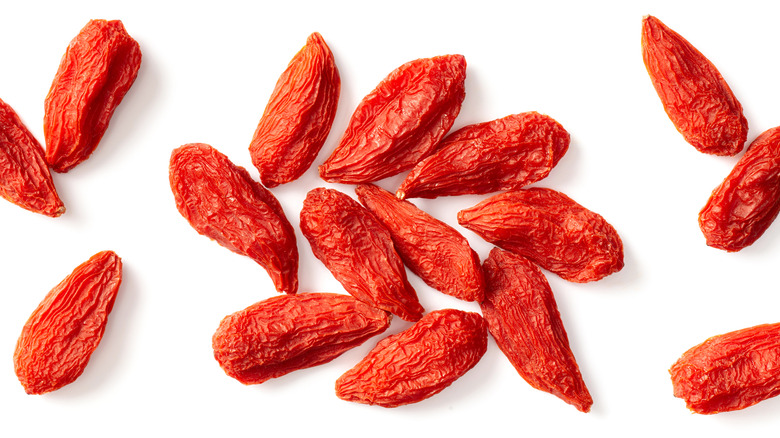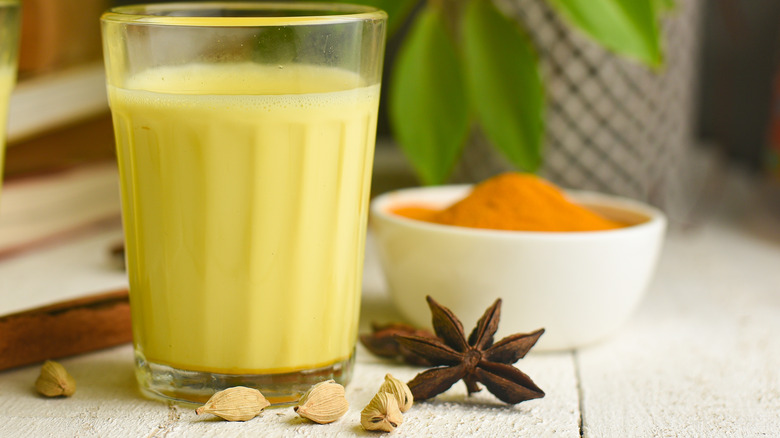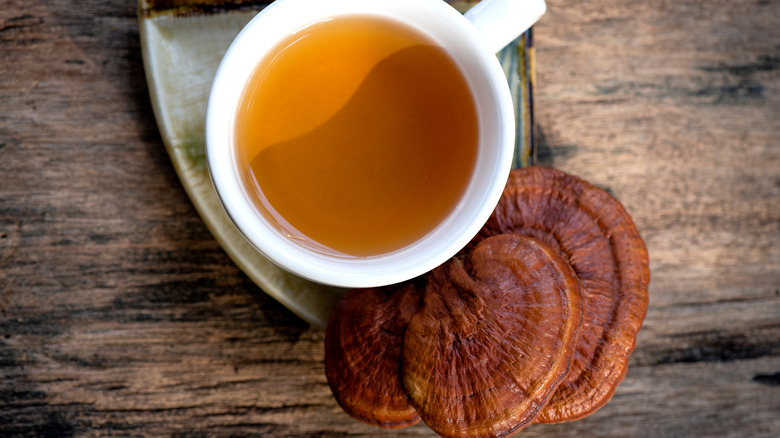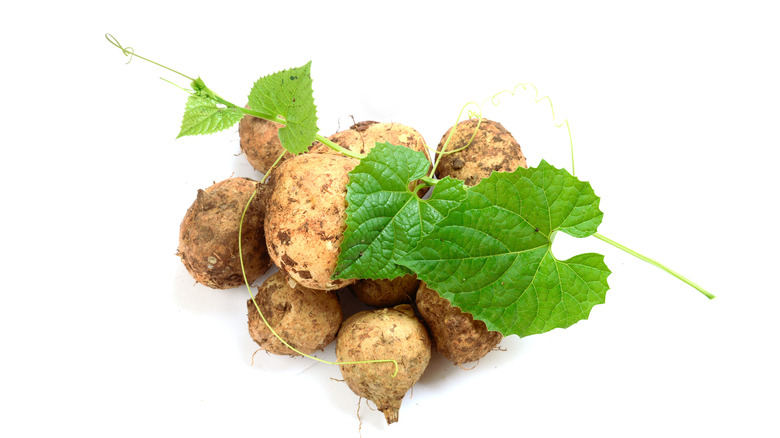Everything You Need To Know About Adaptogens
Maybe you've popped a pill with the word "chill" or "relax" on the bottle, or you've picked up an energy drink infused with herbs to help you "focus." If this sounds like you, you've been dabbling in adaptogens. Simply put, adaptogens are herbs that are said to build your resilience against environmental, physical, or emotional stress (via Verywell Health). Some of them are also said to possess anti-aging qualities. In studies, these herbs appear to modify levels of hormones or the release of stress chemicals.
Healthline explains how they work a little more thoroughly. When we are physically or mentally stressed, we develop something called general adaptation syndrome (GAS). There are three stages in GAS — alarm, resistance, and exhaustion — and adaptogens help to bolster your energy in the resistance phase. They are also said to prevent many ill effects brought about by stress, including immune dysfunction, mental fogginess, and sleep troubles.
In this article we'll dig into some of the most popular adaptogens that you're likely to find at both the drugstore and the supermarket: their common uses, what the scientific evidence has to say, and information on possible side effects and interactions.
What you should know before taking an adaptogen
The U.S. Department of Veteran Affairs states that adaptogens must meet three qualifications: they "must be nontoxic at normal doses, should support the entire body's ability to cope with stress, and should help the body to return to a state of homeostasis regardless of how the body has changed in response to stress." Consumers should remember that there is a complete lack of regulation by the Federal Drug Administration (FDA) for all herbs and supplements in the United States. Seeking out products that carry a seal from the United States Pharmacopeia (USP) or Good Manufacturing Practices (GMP) can improve your chances of getting a product that contains what the label says that it does.
Forbes Health compares slower-acting adaptogens to the quick fix of a cup of coffee or candy bar that you might reach for during a stressful day. However, they can affect each person differently, and Forbes advises using third-party testing resources to research supplements before taking them. They also recommend only starting one new adaptogen at a time so that you can ascertain its effect on your well-being.
Ashwagandha
Among all of its purported benefits – including the treatment of diabetes, joint pain, fatigue, skin conditions, epilepsy, and gastrointestinal disease — ashwagandha is also often used as a treatment for stress and anxiety (via Memorial Sloan Kettering Cancer Center and the Cleveland Clinic), and research has suggested it's effective. For example, in one study published in PLoS One in 2009, employees who had been dealing with moderate to severe anxiety for more than six weeks received either naturopathic care or standard psychotherapy for three months. Naturopathic care entailed dietary counseling, deep breathing relaxation techniques, vitamin supplementation, and ashwagandha. Although both groups demonstrated significant improvements in anxiety, the naturopathic care group displayed more improvement and reported betterment in secondary quality of life measures such as concentration, social functioning, and fatigue.
Ashwagandha may also be a helpful natural remedy for insomnia. In one study published in Cureus, 58 patients with insomnia were divided into two groups and either given full-spectrum ashwagandha root extract or a placebo for ten weeks. Those who received the ashwagandha fell asleep faster, stayed asleep longer, had more efficient sleep, and woke less throughout the night.
Tulsi (Holy Basil)
According to a review published in the Journal of Ayurveda and Integrative Medicine, "Tulsi is recommended as a treatment for a range of conditions including anxiety, cough, asthma, diarrhea, fever, dysentery, arthritis, eye diseases, otalgia, indigestions, hiccups, vomiting, gastric, cardiac, and genitourinary disorders, back pain, skin diseases, ringworm, insect, snake and scorpion bites, and malaria." In other words, it's basically a cure-all.
For people who are overweight or who have elevated blood glucose or cholesterol, holy basil might be especially beneficial. A review published in Evidence-Based Complementary and Alternative Medicine concluded that "the findings from 24 human studies published to date suggest that tulsi is a safe herbal intervention that may assist in normalizing glucose, blood pressure, and lipid profiles, and dealing with psychological and immunological stress." Additionally, a small study published in the Indian Journal of Clinical Biochemistry in 2016 showed dramatic improvement in body mass index, lipid measurements, and insulin levels after eight weeks of use among young (ages 17-30) overweight and obese individuals.
Ginseng
Both American and Asian ginseng are believed to provide a lift to energy levels, bring down blood glucose and blood lipid levels, alleviate stress, and improve sexual function in men (via Medical News Today). Most of the studies carried out on ginseng are small or are not human trials, so more research will be necessary to confirm ginseng's role as a possible treatment for these ailments. But existing research is suggestive, if not conclusive. For example, one small study of 21 men and 69 women showed that ginseng improved the energy levels of people coping with chronic fatigue (PLoS One). Another study that appeared in Oncotarget in 2018 determined that, according to results in both animal and cellular model studies, compounds in ginseng potentially treat cognitive defects by activating defenses against oxidative stress and inflammation.
These same ginsenosides that reduce inflammation in the body might also impact the production of insulin, a hormone that helps to transport blood sugar out of the blood and into cells and makes the cells more receptive to the blood-sugar-lowering hormone — although the authors of a study on ginseng's impact on diabetes management note that further research will be necessary to confirm the link (PLoS One).
Rhodiola
According to a study published in Phytomedicine, various studies have determined that extract of Rhodiola — an herb sometimes called arctic root or golden root (via Healthline) — provides anti-fatigue benefits and improves concentration and mental performance in healthy adults. Furthermore, the study authors note that encouraging results have indicated that Rhodiola may be useful in treating mild to moderate depression and generalized anxiety. However, The Memorial Sloan Kettering Cancer Center warns that Rhodiola is thought to interact with many prescription medications, including antidepressants and medication used to treat hypertension, among many others. So, if you're considering adding Rhodiola to your daily routine, be sure to discuss it with your doctor or pharmacist.
There are a variety of other uses for which Rhodiola might be beneficial — including treatment for altitude sickness, bladder cancer, and tuberculosis, or to enhance athletic performance — though evidence to confirm its effectiveness isn't yet robust enough to recommend it for these uses (via RxList).
Astragalus
Astragalus has long been used in traditional Chinese medicine to relieve night sweats, diarrhea, immunity, and fatigue (via Verywell Health). Although this herb may help prevent the common cold, there isn't enough evidence to recommend it for that use to the general public. Some people have added astragalus to their prescription medication, hoping it will benefit their heart since it is hypothesized to have a diuretic effect and promote vasodilation.
A review published in the Cochrane Database of Systematic Reviews examined 22 studies including 1,323 patients, and concluded that although there are some "promising effects" demonstrated among individuals with kidney disease who use astragalus in addition to traditional treatments (including dialysis). That said, the authors noted that "suboptimal methodological quality and poor reporting meant that researchers could not make definite conclusions based on available evidence."
People with any form of autoimmune disease, including inflammatory bowel disease and type 1 diabetes, are advised to avoid astragalus unless otherwise advised by a healthcare professional (via Verywell Health).
Schisandra
Kaiser Permanente suggests that schisandra may be somewhat effective for the treatment of menopausal symptoms. This is based on a double-blind trial published in Climacteric, which demonstrated that supplementation dramatically improved symptoms compared to a placebo. Additionally, WebMD points out that this adaptogen is possibly effective for improving liver function and preventing liver damage. In an Indonesian study published in the Chinese Medical Journal, among 56 participants with liver disease, liver enzymes dramatically decreased after four weeks of treatment with schisandra.
Though schisandra has also been thought to help treat or prevent such conditions as the common cold and sore throat, fatigue, hay fever, hepatitis, infection, irritable bowel syndrome, and liver support, there is little or no scientific evidence to support its efficacy for these uses (via Kauser Premanente). WebMD also concludes that there is not enough evidence to recommend it for exercise performance, symptoms of menopause, nearsightedness, pneumonia, diabetes, high blood pressure, or the prevention of motion sickness.
Eleutherococcus (Eleuthero Root)
There is some evidence that eleuthero may help prevent or reduce genital herpes flare-ups (via MedlinePlus). Though less supported by existing research, eleuthero may also aid in cognitive function. According to a study published in the Archives of Gerontology and Geriatrics, eleuthero might improve "feelings of well-being" and improve memory among healthy middle-aged, and older people who took eleuthero extract for four weeks. That said, the benefits in quality of life among people over the age of 65 only lasted for four weeks after the end of the treatment.
There is not yet enough scientific evidence to support any of the other traditional uses of eleuthero, including controlling blood sugar levels in those with diabetes, boosting athletic performance, reducing hangover symptoms, and easing nerve pain (via MedlinePlus). Please note that there is a very long list of drugs that might potentially interact with eleutherococcus — definitely speak to your doctor before taking any products containing it, as you should with all supplements.
Cordyceps
There is no easy way to say this — cordyceps is a "parasitic fungi that grow on the larvae of insects" (via Healthline). The thing is ... it might bring certain health benefits if you can stomach the idea! In fact, the Chinese have used it for many centuries to treat various conditions from general malaise to kidney disease and decreased libido. In China, cordyceps is also an approved treatment for arrhythmia (irregular heartbeat). Like many of the other adaptogens discussed here, there is a dearth of quality research in humans.
However, there is some evidence, including a study published in the International Journal of Medicinal Mushrooms, proving that cordyceps might improve energy delivery to muscles during physical activity, which boosts endurance, especially among individuals who are new to exercise (vs. trained athletes). Additionally, animal and laboratory studies have shown some potential anti-aging and cancer-inhibiting properties of cordyceps, including research published in Phytotherapy Research and International Journal of Molecular Sciences. Still, no human trials have demonstrated these effects.
Researchers believe that cordyceps might act similarly to insulin, flinging the doors open so that glucose in the blood can enter cells throughout, thereby decreasing blood glucose levels. Indeed, in one study on diabetic rats published in Oxidative Medicine and Cellular Longevity, four weeks of treatment with cordyceps decreased plasma glucose, food and water intake, and urine output, along with normalization of elevated blood lipids. The supplement also appeared to protect the kidneys of these rats, and to decrease inflammation.
Goji Berry
Goji berry, which hails from China, took the U.S. by storm in recent years, heralded as a "superfood" (via Oxidative Medicine and Cellular Longevity). Also known as the wolfberry, this fruit is eaten by those hoping for long life — according to Healthline, these berries might slow aging and help preserve good vision, and they're also used to fortify organs, including the liver and kidneys.
Five tablespoons of dried goji berries will provide nearly four grams of fiber, four grams of protein, and 501% of the Daily Value (DV) for vitamin A. The berry packs a powerful punch of antioxidants, demonstrating reduced markers of oxidative stress in lab studies. These antioxidants explain why goji berries have long been thought to prevent illness and improve immunity. Indeed, in a month-long study published in the Journal of Medicinal Food, older adults who drank a half-cup of goji berry juice daily had measurably increased markers of immunity in their blood compared to a placebo group. The participants who'd consumed the goji berry juice also reported a general improvement in feelings of well-being.
Turmeric
Turmeric is one adaptogen that most of us are familiar with these days — supplement bottles line the shelves of most drugstores (via Healthline), and golden milk lattes have comforted many of us recently (via Healthline). Unfortunately, as soothing as a beverage with turmeric can be on a cold day, they probably don't contain enough of the adaptogen to improve your health — you'll need supplements to garner the benefits, although adding black pepper does help with the absorption quite a bit, boosting it by up to 2,000% in animals, according to research published in Planta Medica.
The active ingredient curcumin gives turmeric its golden color and is to thank for many of its healthy attributes, including its anti-inflammatory and antioxidant properties. According to EMBO Reports, because of these anti-inflammatory capabilities, some people rely on curcumin as a natural treatment for a wide range of conditions including inflammatory bowel disease, pancreatitis, and arthritis.
Many people also take curcumin because it is believed to benefit the brain in various ways — by protecting against Alzheimer's and other common degenerative diseases, and reducing depression (via Healthline). It may do this by increasing levels of an important protein in the nervous system (brain-derived neurotrophic factor) that keeps nerve cells healthy and important in learning and memory. In an inspiring study, 1,000 mg of curcumin worked just as well as 20 mg of Prozac. That said, this one small study in no way means that you can switch out your antidepressant! You may want to talk to your doctor about adding curcumin to your regimen, though.
Reishi
Reishi mushrooms are taken by some people hoping that they will strengthen their immune system and battle cancer (via MedicalNewsToday). However, there isn't much evidence to back up these claims — and unfortunately, it actually appears that reishi mushrooms might be detrimental to well-being. According to MedicalNewsToday, those using reishi mushrooms have reported side effects including stomach discomfort and nausea, skin rashes and itchiness, trouble sleeping, and, most worrisomely, liver damage. This liver toxicity is what leads most medical professions to dissuade their patients from using it. Reishi supplements might also increase the risk of bleeding and should be avoided by anyone with bleeding disorders. They might also cause blood pressure to fall and can cause dangerous interactions with immunosuppressive medications, such as those taken by organ transplant recipients. The Cancer Network also warns that reishi interacts with some chemotherapeutic drugs and should never be taken by those undergoing cancer treatment without doctor approval.
Maca
Maca, a root vegetable originating in the Andes mountains, is generally taken for hormonal conditions including menopausal symptoms, low libido, and male infertility (RxList). It is also thought by some to increase strength and endurance. Others claim that maca helps with anemia, chronic fatigue syndrome, memory problems, depression, and immune concerns.
So far, studies on these purported uses have been small and only partially conclusive. For instance, one study on 45 women published in Evidence-Based Complementary and Alternative Medicine concluded that maca root might be an appropriate treatment for antidepressant-induced sexual dysfunction. Another small study of 29 postmenopausal women found that maca decreased diastolic blood pressure and symptoms of depression after six weeks of supplementation (via Climacteric).
Because it is thought to be a phytoestrogen, it should not be taken by those with estrogen-sensitive cancers, endometriosis, or uterine fibroids (via Medline Plus). The Memorial Sloan Kettering Cancer Center adds that maca might cause menstrual irregularities, mood changes, cramps, gastritis, and sleep disturbances. It may also alter the results of testosterone testing.
Wild Yam
For several centuries, wild yam has been used to treat menstrual cramps, morning sickness during pregnancy, and menopausal symptoms (via Mount Sinai). However, these "benefits" are likely a prime example of the placebo effect. The truth is that although wild yam contains a phytoestrogen called diosgenin that can be converted to progesterone in a laboratory, it can't be converted without assistance in the human body. In women, the hormone progesterone is produced in the ovaries, and it's necessary for successful conception and pregnancy outcomes (via WebMD). Changing levels of progesterone will alter the menstrual cycle and cause many of the symptoms associated with menopause, and for this reason progesterone is commonly used in the treatment of menopausal symptoms (via You and your Hormones). Because the diosgenin in wild yam can't actually be converted to progesterone in the body, it is unlikely to treat menopausal symptoms or osteoporosis. Confirming this, a small study of 23 women who used a cream containing wild yam for three months described no difference in their menopausal symptoms (via Climacteric).
Wild yam should not be taken without prior physician approval if you have had hormone-related cancer, a close family member has if you're breastfeeding or pregnant (or could become pregnant), or if you are taking oral contraceptives or are on hormone replacement therapy (via Mount Sinai).
